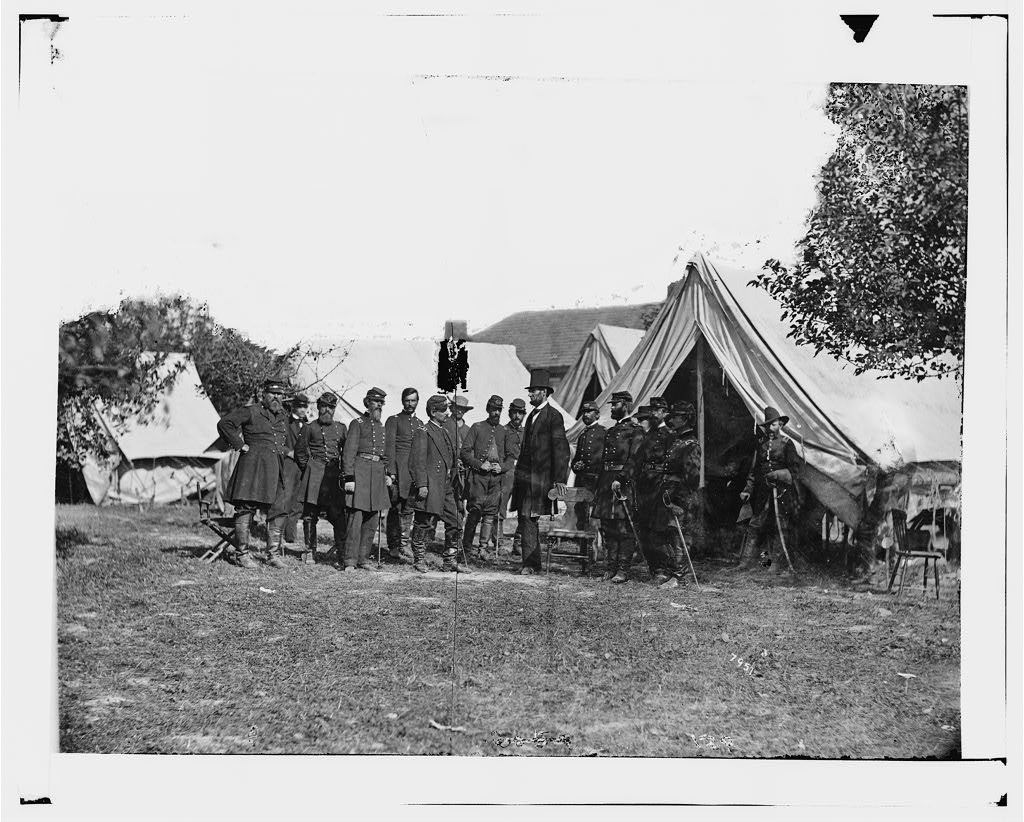What's it like to be my hero? What's it like to have compassion, morality, humility, and confidence? What's it like to preserve America during its first major internal conflict? What's it like to growing up in a cramped, one-room log cabin in Kentucky to becoming the nation's 16th president? Ask Abraham Lincoln.
Starting off life as an unlikely hero, Abraham's early life was far from ideal. When he wasn't working up and down in the fields, Lincoln struggled to receive an education, and suffered the loss of his mother at an early age. He was self-taught, borrowing books from his neighbors and reading whenever he could. His father's support of antislavery also had a strong impact on Lincoln's early life, which then led to his ultimate presidential victory, as he was able to capture the attention of most of the northern states.
 Antietam, Md. President Lincoln with Gen. George B. McClellan and group of officers] Abraham Lincoln with General McLellan[Public Domain] Library of Congress Reprod # LC-DIG-cwpb-04352
Antietam, Md. President Lincoln with Gen. George B. McClellan and group of officers] Abraham Lincoln with General McLellan[Public Domain] Library of Congress Reprod # LC-DIG-cwpb-04352
After his childhood ended, Lincoln moved out of his small Kentucky [Illinois - ed.] hometown and tried his best to make a name for himself. He wanted a change, and he was determined to make that change. Initially unsuccessful in the Illinois state senate, Lincoln had to ask himself what he needed to do in order to gain the votes of the people. The answer was slavery. A controversial American issue since 1619, the support of the abolishment of slavery gave Lincoln numerous votes and support in the legislature. Enough votes to make him win. Lincoln had set a goal for himself and he took the actions needed to reach that goal. This heroic mindset was only the start of Lincoln's successful political career.
Following his presidential victory against opponent Stephen Douglas, Lincoln needed to stay true to his goal. He had to lead the way towards abolishing slavery; it was his promise to the people. Maybe that's why they call him "Honest Abe." But first, he needed to conquer the growing internal conflict that America was facing, the Civil War.
"America will never be destroyed from the outside. If we falter and lose our freedoms, it will be because we destroyed ourselves" (Lincoln). As said by Lincoln himself, the Civil War was a major turning point in the history of the United States because America wasn't fighting a foreign country; we were in conflict with ourselves. Torn between issues such states' rights and slavery, the Union and the Confederacy were continually up in arms. Abraham Lincoln had to be the middleman. He had to have confidence in order to keep the peace between the two sides and preserve America, as we know it. Lincoln's timely leadership and composure is what allowed America to stay united through conflict, and that's pretty heroic, if you ask me.
My Hero suggested viewing | Abraham Lincoln - U.S. President | Mini Bio from Biography Channel
Lincoln, however, had to resume focus during his second term. He needed to reach his goal; it's what heroes do. Since a majority of Lincoln's first term was spent adjusting the office and dealing with the beginnings of the Civil War, he now needed to tackle slavery, as it is what he promised to the people. Lincoln started by offering the slaves compensation by returning pieces of land, yet this wasn't enough. Lincoln desired everlasting change. Trying and trying again, Lincoln repeatedly faced failure, but he just wouldn't quit, until the creation of the Emancipation Proclamation, the beginnings of the 13th Amendment. A showcase of his morality, compassion for equality, and humility, the creation of the Emancipation Proclamation clearly showed me that he didn't necessarily care for the prestige of the presidency, he just wanted to accomplish his goal of equality - so he did.
Additionally, during his presidency, Lincoln found himself in a tight relationship with the Jewish people. Rabbi Abba Hillel Silver even went as far to proclaim Lincoln a "Saint of Democracy" and said that Lincoln reminded him of one of the ancient prophets in Israel. These kind statements came from Lincoln's acceptance and understanding of their Eastern European immigration to America. Lincoln proved himself as welcoming towards the Jews (Gary P. Zola). Lincoln's great compassion and morality towards the Jews allowed for a strong foreign policy that would eventually influence other presidents, such as Woodrow Wilson, to do the same.
Abraham Lincoln is my hero because he inspired, cared for, and led America during one of its hardest times. He paved way for equality among all citizens and set forth pivotal foreign relationships. Most heroes wear capes; mine wore a stovepipe hat.
Bibliography
Abraham Lincoln - Standing as a Hero." Legends of America. N.p., n.d. Web. 04 Dec. 2015.
Digital image. Civil War Trust: Saving America's Civil War Battlefields. N.p., 2014. Web. 4 Jan. 2016.
Digital image. Dynadot. Samantha Banks, 6 Nov. 2014. Web. 4 Jan. 2016.
Holzer, Harold. ""Lincoln, Abraham."". World Book Advanced. World Book, 2010. Web.
Rothstien, Edward. "The Unusual Relationship Between Abraham Lincoln and the Jews." Mosaic Magazine RSS. N.p., 1 Apr.
2015. Web. 04 Dec. 2015.
Union Military Leaders. Digital image. History.com. A&E Television Networks, 2016. Web. 04 Jan. 2016.
Zola, Gary Phillip. "Abraham Lincoln and the Jews: how he became 'Rabbi Abraham'."Commentary 137.5 (2014): 51+.
General OneFile. Web. 2 Dec. 2015.
Page created on 2/1/2016 12:00:00 AM
Last edited 6/19/2020 5:50:59 AM
